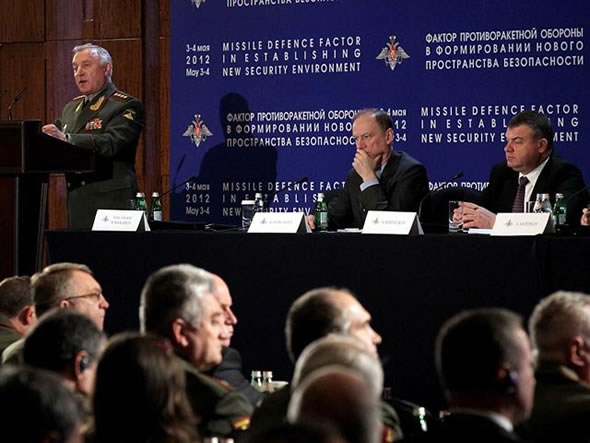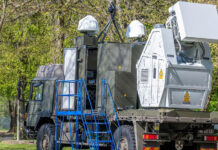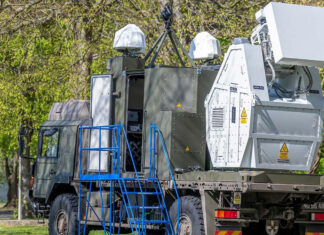The United States has ruled out reports that it might give up the idea of putting interceptor missiles in the European missile system in Poland considering Russia’s concerns that it poses threat to strategic stability. “There’s no indication that we might give up the interceptors in Poland. We’re not agreeing to any limitations on our systems,” Madelyn Creedon, U.S. Assistant Secretary of Defense for Global Strategic Affairs, said at a special briefing on Wednesday.
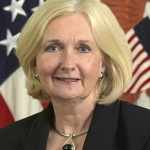
Creedon, along with Ellen Tauscher, Special Envoy for Strategic Stability and Missile Defense, is leading a U.S. delegation at the Missile Defense Conference organized by the Russian Ministry of Defense. She insisted that “the United States is and remains committed to implementing the missile defense system in all of its four phases. She made it clear that Washington will not accept any limitations on either the number or the capabilities of these systems.
Tauscher said the United States had listened to Russia’s concerns and had taken them seriously. “We have been transparent with Russia and have held close consultations with them over the last several years. We have discussed how the European missile system is designed and configured to counter ballistic missile threats from the Middle East. We have demonstrated through technical discussions that the system is not directed at Russia and cannot intercept Russian ICBMs. And we believe the best way for Russia to be convinced is to join us in missile defense cooperation. Russia can use its own eyes and ears to see for itself that our missile defenses cannot negate or undermine its strategic deterrence,” she told reporters.

Tauscher reiterated that while the two governments could work in cooperation, Washington could not agree to pre-conditions outlined by the Russian government. “We cannot agree to any limitations on our missile defense deployments,” she added.
However, Tauscher said the U.S. side was ready to agree to a political statement that its missile defenses were not directed at Russia. Such a political statement would publicly proclaim “our intent to cooperate and chart the direction for cooperation, not limitations,” she said.
Tauscher expressed the hope that her “Russian colleagues recognize that we have no capability or intent to undermine strategic stability, that our objective is not about winning public relations points, and that our cooperation is a much better approach than sticking to the previous pattern of competition.” .
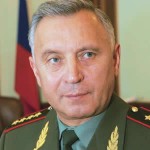
Russia’s top military officer has threatened to carry out a pre-emptive strike on U.S.-led NATO missile defense facilities in Eastern Europe if Washington goes ahead with its controversial plan to build a missile shield. President Dmitry Medvedev said last year that Russia will retaliate militarily if it does not reach an agreement with the United States and NATO on the missile defense system.
Chief of General Staff Nikolai Makarov went even further Thursday. “A decision to use destructive force pre-emptively will be taken if the situation worsens,” he said at the international conference attended by senior U.S. and NATO officials. Russian Defense Minister Anatoly Serdyukov also warned on Thursday that talks between Moscow and Washington on the topic are “close to a dead end.”
U.S. missile defense plans in Europe have been one of the touchiest subjects in U.S.-Russian relations for years. Moscow rejects Washington’s claim that the missile defense plan is solely to deal with any Iranian missile threat and has voiced fears it will eventually become powerful enough to undermine Russia’s nuclear deterrent. Moscow has proposed running the missile shield jointly with NATO, but the alliance has rejected that proposal. Makarov’s statement on Thursday doesn’t seem to imply an immediate threat, but aims to put extra pressure on Washington to agree to Russia’s demands.
The two-day conference in Moscow is the last major Russia-U.S. meeting about military issues before a NATO summit in Chicago later this month. Russia has not yet said whether it will send top officials.
In a candid, lively exchange during a conference side session, officials talked about the high level of distrust remaining between the two sides.
“We can’t just reject the distrust that has been around for decades and become totally different people,” Russian Deputy Defense Minister Anatoly Antonov said in addressing U.S. and NATO officials. “Why are they calling on me, on my Russian colleagues, to reject distrust? Better look at yourselves in the mirror.”
U.S. State Department special envoy Ellen Tauscher responded that neither country can afford another arms race. “Your 10-foot fence cannot cause me to build an 11-foot ladder,” Tauscher said. “It’s going to have to take a political leap of faith and it’s going to take some trust that we have to borrow, perhaps, from each other and for each other, but why don’t we do it for the next generation?”
The Obama administration tried to ease tensions with Russia in 2009 by saying it would revamp an earlier Bush-era plan to emphasize shorter-range interceptors. Russia initially welcomed that move, but has more recently suggested the new interceptors could threaten its missiles as the U.S. interceptors are upgraded.
The U.S.-NATO missile defense plans use Aegis radars and interceptors on ships and a more powerful radar based in Turkey in the first phase, followed by radar and interceptor facilities in Romania and Poland.
Russia would not plan any retaliation unless the United States goes through with its plans and takes the third and final step and deploys defense elements in Poland, Antonov said Wednesday. That is estimated to happen no earlier than in 2018. Russia has just commissioned a radar in Kaliningrad, its western outpost near the Polish border, capable of monitoring missile launches from Europe and the North Atlantic.
Meanwhile, U.S. Senator John McCain, on a visit to Lithuania, lashed out at Russia’s plans in Kaliningrad.
McCain said using missile defense as an “excuse to have a military buildup in this part of the world, which is at peace, is really an egregious example of what might be even viewed as paranoia on the part of Vladimir Putin.”

On Thursday, at the start of the conference attended by representatives from about 50 countries, Russia’s Security Council secretary reiterated Moscow’s offer to run the missile shield together with NATO. Nikolai Patrushev said such a jointly run European missile defense system “could strengthen the security of every single country of the continent” and “would be adequate for possible threats and will not deter strategic security.”
NATO’s deputy secretary general, Alexander Vershbow, told the conference that the U.S.-led missile shield is “not and will not be directed against Russia” and that Russia’s intercontinental ballistic missiles are “too fast and too sophisticated” for the planned system to intercept.

